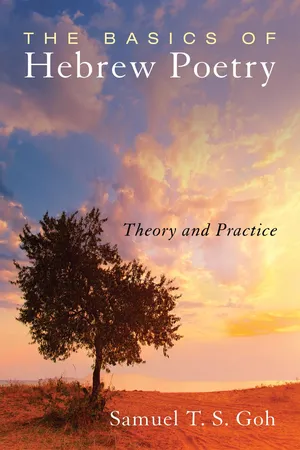![]()
1
Hebrew Poetry
The Art of Versification
Poetry: Versification of Reality
It is universally acknowledged that the Greek philosopher Aristotle is the first person who provides an extended philosophical treatment of poetry in his Poetics. For Aristotle, poetry is an artistic representation (mimesis) of reality. By this he means the poet mimics real life experience through poetry. In other words, poetry is a representation of reality by versification.
People employ many means to represent their real life experience. Some choose to narrate it (hence we have stories); others paint it (paintings); yet others film it (movies). The poet, naturally, versifies it (i.e., turning it into poetry). The English poet William Blake (1757–1827) versified spring as an angelic male figure:
Elsewhere, in ancient China, the Chinese poet Meng Haoran (689–740), versified his experience of spring:
We have similar examples from the Old Testament. The final author of Exodus first narrates God’s deliverance of the Israelites in Exodus 14 then versifies the same event in Exodus 15. Elsewhere, a psalmist versifies his experience of God’s providence (Ps 23:1–2):
The biblical poets versify all sorts of reality: natural and supernatural; physical and spiritual. Their art of versification has produced various kinds of poetry: praises, lament, complaints (Psalms), wisdom teaching (aphorisms and wise sayings in Proverbs), discourse, dialogue (Ecclesiastes and Job), and love songs (Song of Songs). All these various versifications reflect the diverse human experiences and real life phenomena behind the poetic texts.
The Difficulties of Understanding Hebrew Poetry
To understand a poet’s work, one needs to know the literary conventions by which they versify reality. Unfortunately, in this matter the student of Hebrew poetry is less privileged than the student of Greek poetry. The reason is we have inherited from the biblical poets their versification but not their poetic conventions. Whereas students of Greek poetry have Aristotle’s Poetics to thank, students of Hebrew poetry have received no such systematic theorization from the ancient Hebrews. Therefore, a student of Hebrew poetry faces a lack of information about how its poets versified reality and how their versification should be understood.
This difficulty is compounded by the fact that the poetic texts at hand, which are presented in the Masoretic Text (hereafter MT), are centuries after their composition. Having gone through layers of redaction and centuries of transmission, textual problems are therefore inevitable. This being the case, what we have today does not look like exactly what the poets had composed originally. As such scholars are uncertain about the original arrangement of the poetic lines, the overall structure which the poet had in mind, and the original pronunciation and rhythm. While this does not undermine the inspirational nature of the text, it does hamper our understanding of its literary nature.
Given that so little information is accessible to us, James Kugel seems justified when he asks whether the term “biblical poetry” would in fact be foreign to the Old Testament poets. The majority of scholars, however, do not share such pessimism. They are rather confident that the poetic texts themselves offer us many clues about their conventions. Robert Alter, for example, offers an optimistic note: “The difficulties, however, need not be overstated. There remains much that can be understood about biblical verse,” and that Hebrew poetry “may exhibit perfectly perceptible formal patterns that tell us something about the operations of the underlying poetic system.”
This optimism is echoed by many biblical scholars, as testified by the many taxonomies of Hebrew poetry. The taxonomies are usually carried out mainly by looking within the Hebrew texts to understand the workings of Hebrew poetry, and by comparing them with poetic works contemporary to the Hebrew poets....
